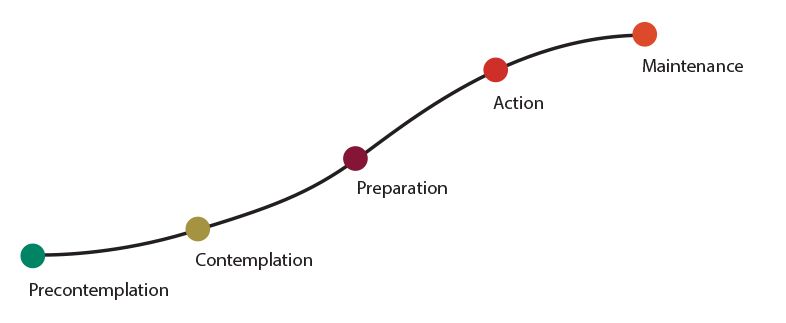+ 123 456 7890
Stages of Change
 The Stages of Change (sometimes called the Transtheoretical Model) tells us that individuals go through different stages when changing a behavior. This theory assumes that individuals have different degrees of motivation and readiness to change, which determine their current stage of change. According to this theory, different stages of change require different information needs and approaches to move the audience to the following stage. Although people may move through these stages in a predictable way, an individual can drop back or jump over stages. The stages are:
The Stages of Change (sometimes called the Transtheoretical Model) tells us that individuals go through different stages when changing a behavior. This theory assumes that individuals have different degrees of motivation and readiness to change, which determine their current stage of change. According to this theory, different stages of change require different information needs and approaches to move the audience to the following stage. Although people may move through these stages in a predictable way, an individual can drop back or jump over stages. The stages are:
- Pre-Contemplation: There is no awareness of the need to change behavior. For example, a mother does not know that there are poor quality malaria medicines in the country.
- Contemplation: An individual is aware that the problem exists and is seriously thinking about overcoming it, but has not yet made a commitment to take action. For example, a mother has learned that some malaria medicines are poor quality and is considering changing her purchasing practices to start buying from a more quality, regulated sector.
- Preparation: An individual intends to take action immediately. For example, a mother is planning to buy malaria from a more quality, regulated source the next time she or her children get diagnosed with malaria.
- Action: An individual begins performing the behavior. For example, a mother who is diagnosed with malaria buys medicine from a higher quality, regulated source, rather that her usual unregulated source.
- Maintenance: An individual continues the behavior and works to maintain it. For example, a mother continues to buy from a higher quality, regulated sector every time she or her children are diagnosed with malaria.
How Can Stages of Change Be Applied?
Stages of Change can be used for personalized interventions targeted at one individual, as well as large scale campaigns. In one-to-one counseling situations, knowing the stage of change of the mother can help the health provider select what information to share. For larger scale campaigns, during the analysis stage, one can segment the audience according to stage of change and tailor information to that stage. Information at the pre-contemplation and contemplation stages would focus on facts, the risks of the current behavior and the benefits of changing behavior. At the preparation and action phases, the provider would focus more on triggers and incentives to action, using more emotional appeals.


